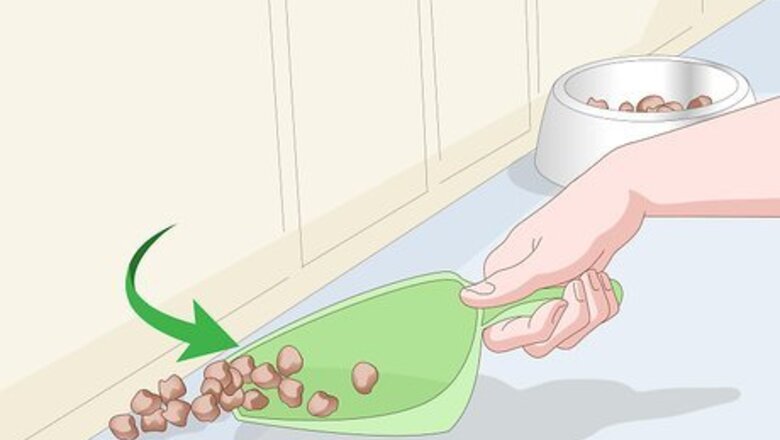
views
Removing Food and Water Sources
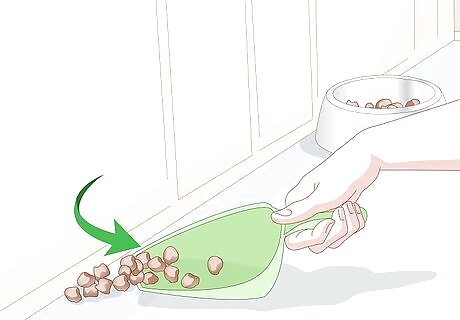
Look for and remove all food sources that the bugs can get into. Inspect areas around your home that have food that water bugs can feed on, including your kitchen and dining room. Also, be sure to look for food sources inside and outside your home. For example, remove pet food that is left out if possible, as roaches and other bugs can live off of your pet's food. If possible, organize meal times so that your dog or cat will eat all of their food immediately and you can remove and wash the bowl. Outside sources of food can include meat and other organic materials in your compost bins, rotting fruit and veggies in your garden, and garbage containers that are not sealed.
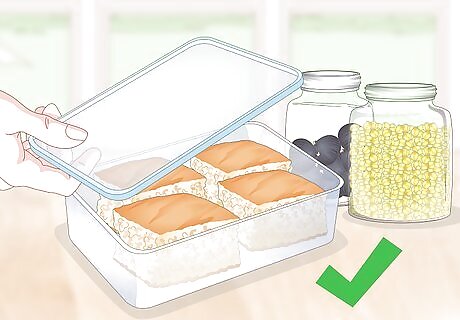
Place all food inside sealed containers. Put fresh food in the refrigerator whenever possible. Food that cannot be refrigerated should be placed inside airtight containers, such as canning jars or other containers designed with a seal. Even if a container only has a small opening, bugs may be able to get into it. It's important to ensure that the containers you pick are totally airtight. If you have a very bad infestation, it's probably a good idea to transfer foods that you buy straight into airtight containers. For example, when you bring a box of cereal home, open it up and move the contents into an airtight container.
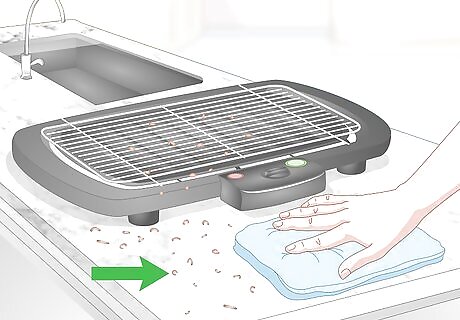
Wipe kitchen counters often to remove crumbs in the kitchen. Water bugs can live off of small crumbs that are left around a kitchen. When making food, be sure to wipe off your cutting board and counter right away. Don't leave any food debris behind, as this can become a meal for the water bugs in your home. When cleaning up these crumbs, make sure you include kitchen appliances, such as the toaster, food processor, juicer, grill and other areas where food particles become trapped.Tip: Wiping your kitchen surfaces with a rag saturated with all-purpose cleaner will help grab all of the crumbs and food residue.
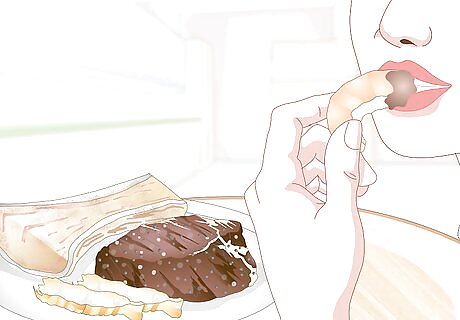
Limit food consumption to a single room in your home. If you can keep food in specific areas of the home, cleaning up after meals will be much easier. For example, only eating at your kitchen table will keep food crumbs confined to that area, and the table will keep a lot of crumbs off the floor. You will also limit the infestation to that area, which will help you focus your efforts at getting rid of it and eliminating it easier. It is easier to remove trapped crumbs from hard floors than from carpeting, so try to eat in a room with hard floors. It's especially important to discourage children from snacking in their rooms or in front of the television. They are likely to leave out food that the water bugs can feed on.
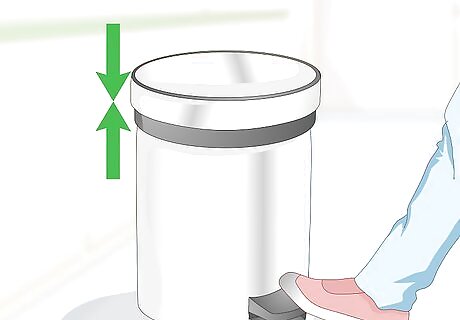
Keep trash and compost in airtight containers. Use trash cans with very tight fitting lids both inside and outside of your home. If you collect compost, make sure your container is not open or accessible to the bugs. Also, take out trash daily during a water bug infestation. Garbage cans and compost containers are places where water bugs commonly feed and reproduce. Even if you leave garbage exposed for a short time, water bugs can get into it and feed, which will give them more nutrients and promote reproduction.
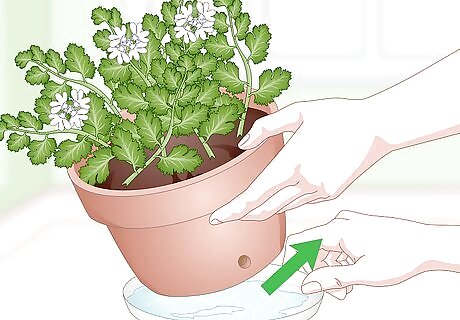
Dry up or remove any sources of standing water in your home. Water bugs cannot live for more than a week without water. If you want to get rid of them, you need to block their access to water. Pet water bowls, glasses of water, and plant saucers can produce inviting places for water bugs. All of these water sources should be removed as soon as you know you have an infestation. If you can't get rid of a pet water bowl completely, just put it out for several limited periods each day and put it away at night.
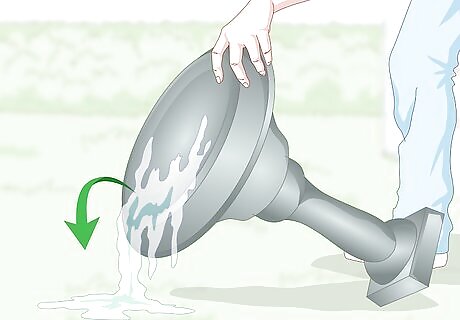
Eliminate any outside standing water near your infestation. If there are sources of water near your home, water bugs can breed outside and then come inside. To avoid this, turn over bird baths, pots, and other containers that collect water during the rainy season. Also, fill in holes in the ground that collect water and don't drain quickly. Also, remove items that trap water, such as tarps and buckets, that you have stored outside. If you have a pool or hot tub, you don't need to drain it to get rid of your waterbugs. Instead, clean it daily and make sure that the chemical levels are correct at all times. If your infestation is outside, it can be difficult to eliminate all sources of water, especially during wet times of year. However, get rid of as many sources of water as you can to make the area as unattractive as possible.
Cleaning up Areas That Attract Water Bugs

Pick up clutter, dirt, and garbage in your home. Roaches, palmettos, and other water bugs often live in places that are rarely cleaned and moved. To get rid of an infestation, you need to clean out all of these undisturbed places and remove items they could live in. Common places that need to cleaned out include: Newspaper piles: Recycle newspapers every week. Make sure your inside recycling containers have tight-fitting lids over them. Food containers: Clean up food containers immediately after using them. Leaving them out even one day can increase your infestation. Old cardboard boxes: These are popular hiding places and shouldn't be kept in your home if you have an infestation.
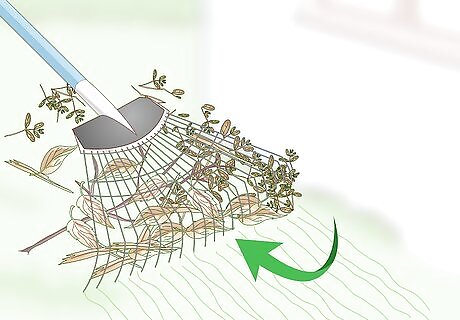
Clean up debris near the perimeter of your home. Some water bugs can breed outside and then come into your home. This is why it's especially important to remove piles of leaves, sticks, lumber, or general yard debris close to, or right on, the walls of your home. Look at areas on your foundation that have cracks or holes and make sure there are not potential breeding areas near them outside. Patch these cracks and holes to prevent bugs from getting in through them.
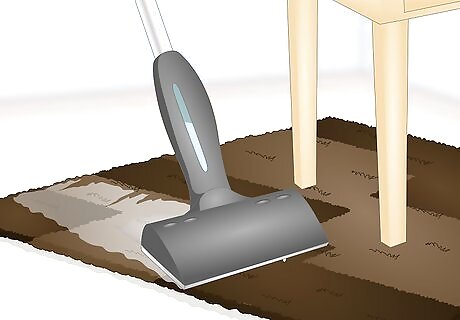
Wash or vacuum soft surfaces near the infestation. If you have had an active infestation in an area that has carpets or rugs, clean those carpets and rugs right away. Also vacuum the surfaces and crevices of fabric-covered furniture, such as couches and chairs. Water bugs can get food by eating crumbs that are dropped in the crevices of furniture. It is important to vacuum out these crevices to remove any food that might be in there.
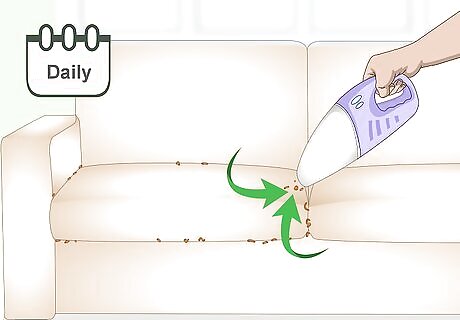
Vacuum your home daily during an infestation. Vacuuming can get rid of both food for the bugs and eggs that could become more bugs. It's especially important to vacuum rooms where food is consumed, such as the dining room. This will reduce the amount of food available around your home. If you have kids eating in your home, it's a good idea to vacuum after every meal, if possible. This will remove any food they may have dropped in your home.
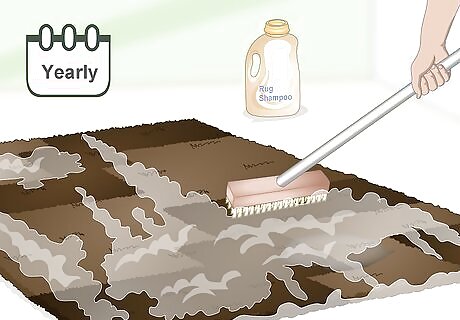
Shampoo your rugs or carpets at least once per year. Giving your rugs and carpets a regular shampooing will remove any eggs that might have been laid in the fibers, which will help stop a new generation of the bugs from being born. It will also remove any food trapped in the carpet that water bugs might eat. You can either rent or purchase a carpet cleaner and do it yourself or you can hire a professional carpet cleaner.
Making Household Repairs
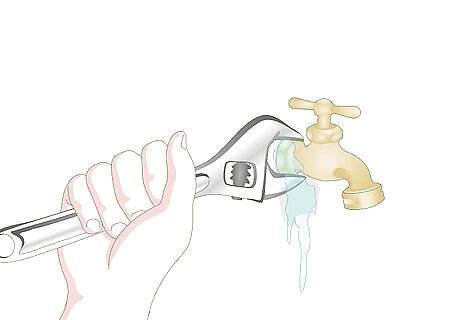
Fix leaky faucets inside and out. Look at all of your faucets and turn them on and off to make sure they are watertight. This includes faucets in your bathroom, in your kitchen, and on the outside of your home. Make sure to place any leaks on your to-do list immediately. Most leaky faucets can be easily fixed by replacing their gaskets. However, sometimes they are worn out and need to be totally replaced. Cockroaches can stay alive for a long time if they have a constant water source. Look for leaks under sinks and behind appliances as well. These hidden leaks make perfect breeding grounds for water bugs.
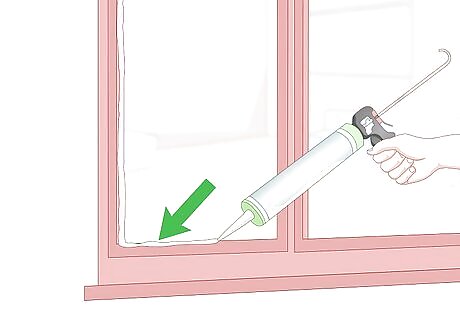
Look for and fix any gaps around doors or windows. Cockroaches can get into your home by squeezing into very small gaps around doors and windows. Fill gaps with caulking, foam, or other sealing supplies so that bugs cannot enter. You can also replace individual doors and windows if gaps cannot be filled effectively. There are a variety of ways to seal gaps around doors and windows. They include, but are not limited to, using expanding foam, wood shims, or metal flanges. If you have a gap under your outside door, consider putting a draft sweep at the bottom of the door.
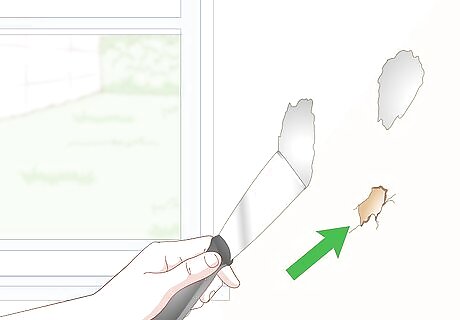
Fill all holes in your insulation and walls. This will remove ways for the water bugs to get into your home and set up a nest. Inspect all of your walls, including in your basement, if you have one, and entry points for pipes and utilities and cracks or damage to the building. Use a flashlight to look at every surface and determine if there are any areas where you can feel air coming in from the outside. If you find holes, fill them with a patch, expanding foam, or another type of filler. Pay particular attention to spots in your walls where pipes enter the home. These are not always sealed well and make an easy route for water bugs to get in. Filling holes in concrete will also reduce the accumulation of water, which can help the water bugs survive.
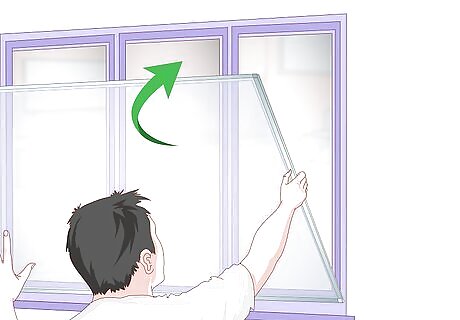
Place screens on your windows and doors. Water bugs can come in through any open window or door that doesn't have a screen on it. To avoid this, get tight-fitting screens and make sure they are in place any time your windows are open. Also put a screen door on any doors you like to keep open. First, measure the width and height of the opening so that you can get a screen that fits exactly. Then go to your local home improvement or hardware store find a screen that will fit perfectly. If your local stores don't have anything the fits the bill, you may need to order a replacement online.Tip: Once your windows and doors have screens, you can open them to create circulation in damp areas. Water bugs prefer damp areas, so putting on screens and making your home drier and well-ventilated can deter them from staying.
Killing the Bugs with Chemicals
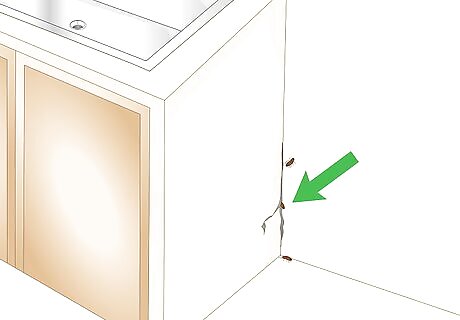
Identify where the nest or nests are located. This will help you get rid of the water bug problem in a quick and targeted manner. Pay attention to where you see the bugs. Then look in crevices and hidden nooks in that area. If it's not obvious where they are living, wait to look for them at night. After a room has been dark for several hours, turn on the light and see where they scatter to. This is where you should target your eradication efforts.
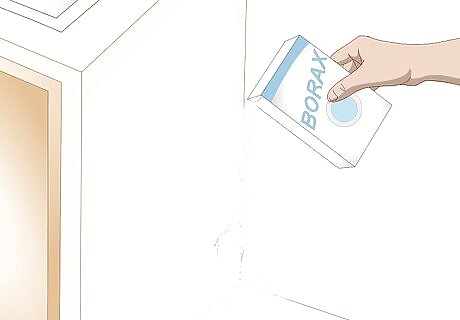
Apply Borax or boric acid around the nest if you have found it. If this is a dirty area, such as an unfinished basement, you can put either one right on the ground. If it is a finished area, you can put either one on a piece of cardboard or tray. When the water bugs walk over it, the sodium tetraborate in Borax or the boric acid will seep into their legs and kill them. Borax is slightly safer to use in your home than boric acid. However, even Borax shouldn't be ingested or inhaled. Keep small children and pets away from both Borax and boric acid if you use it to get rid of your infestation. Borax is available at most big box and hardware stores.Tip: Water bugs avoid large clumps of Borax, so make sure to use a very thin dusting.
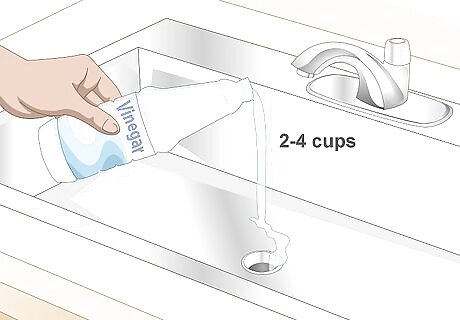
Pour 2 to 4 cups (470 to 950 mL) of distilled vinegar down each drain. Water bugs often live in drains, as they are great sources of water and protected areas. If you have the bugs in your drains, you can kill them, or at least make the drains uninhabitable, by pouring vinegar right down every drain. Repeat this daily until the waterbugs are gone. Remember to treat your dishwasher, bathtub, and toilet drains, in addition to your sinks.
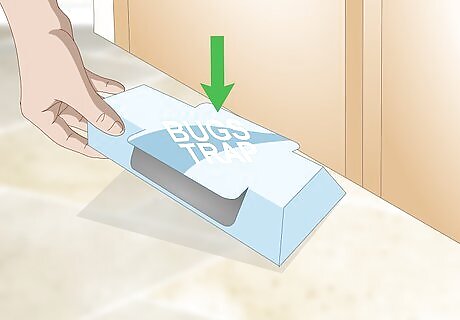
Place traps in areas where you have seen the bugs. You can use glue board traps or box traps that have a concentrated poison inside. Water bugs are attracted to both and they die once inside the box or once trapped to the glue board. Once there is a dead bug in the trap, throw it into your outside garbage can. Most box traps come with the poison inside of them. You simply need to follow the included directions to set them up. If you plan on putting traps outside, make sure the traps you get say they can be used outside. There are a wide variety of these traps available. Look for them at your local big box or home improvement store.
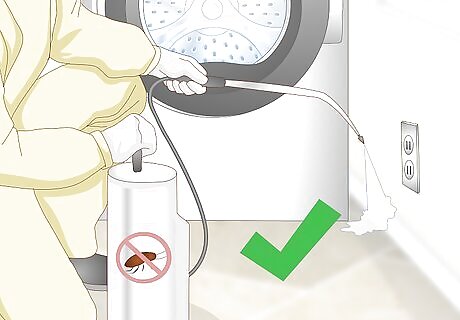
Hire an exterminator to eliminate the bugs and prevent infestations. If your house is infested with water bugs, you may need to use a more aggressive chemical treatment. Contact a local exterminator and have them come inspect your home. If they think your home needs to be treated with pesticides, you will have to leave it for anywhere from a few hours to several days, depending on the chemicals the exterminator wants to use and how bad the infestation is. In most cases, your exterminator will visit your home several times. The first time will be to treat the problem and then again after a week or two to make sure the infestation is gone. Many exterminators will come back another time after several weeks to ensure that there is no reinfestation. After your problem has been treated with pesticides, clean all kitchen and other exposed surfaces before using them as normal.

















Comments
0 comment